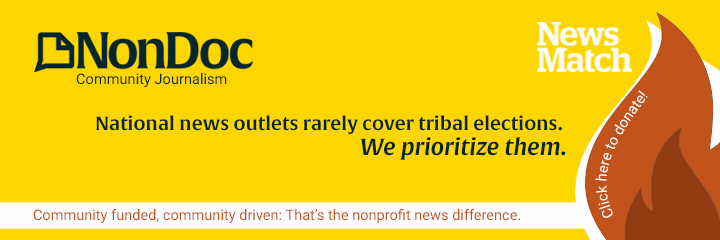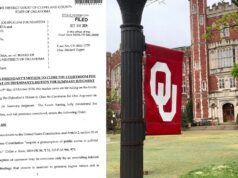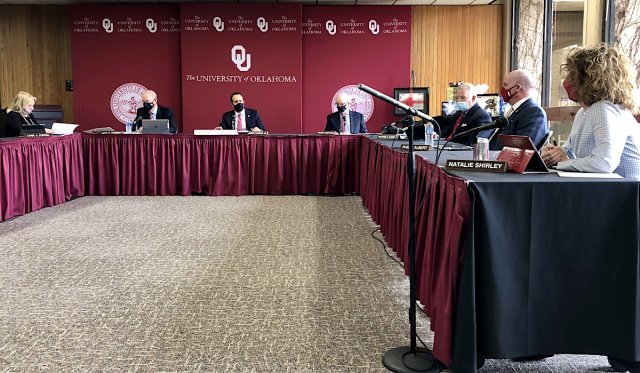
As it attempts to achieve the goals listed in its new strategic plan, the University of Oklahoma Board of Regents approved a pair of momentous actions today and previewed other dynamic initiatives in the works.
The board’s chairman also spoke sternly for eight minutes about a “pitiful” insurance dispute between the OU health system and Blue Cross and Blue Shield of Oklahoma that he said is disrupting care for seriously ill children, among others.
“We need to be reasonable, and we will. They need to be reasonable. I hope they will,” Chairman Gary Pierson said of negotiations between OU Physicians and BCBSOK. “This is a big deal. We’ve talked about a lot of big deals, but this is the biggest because it affects everybody in this state potentially.”
The OU Physicians group has protested its reimbursement rates with BCBSOK, which in turn has said it is prioritizing the management of costs for its members.
The groups’ contract expired Feb. 28, triggering a transition period ahead of full termination. If an agreement is not struck by June 28, BCBSOK policyholders will lose access to OKC-based providers within the OU Physicians network.
Fixed now? OU development program ‘was broken’
Earlier during Friday’s meeting, the OU Office of University Advancement and its fundraising efforts were folded into the nonprofit OU Foundation by a 7-0 vote, which ratified three contracts laying out the complex relationship between the organizations.
“Our development program, which is now going to be known as our advancement program, was broken to our very core. It was inoperative,” Pierson said, appearing to reference the donation reporting issues under former OU Vice President for University Development Tripp Hall. “This is critical to a university. This has been completely torn down to the studs and rebuilt, and it is ready right now to fire. (…) We are going to see results we have never seen.”
Harroz announced that Purdue University’s Amy Noah will be hired as chief fundraising officer. He said the transition of advancement and development operations to the nonprofit OU Foundation led to substantially more qualified applicants for the fundraising position Noah will hold.
The transition of university advancement operations entirely to the OU Foundation could complicate an existing open records dispute that drew a lawsuit in 2018, which the foundation settled.
Replacement of Norman dorm towers on horizon
The board also voted unanimously to commission a Freshman Housing Master Plan that will result in replacement of the 1960s-built dormitory towers that have been criticized by students for mold and other issues in recent years.
“It’s incredibly exciting and it’s been due for a while,” OU President Joe Harroz said. “What we are endeavoring to do is go on a multi-year plan to replace [the towers and about 3,350 beds].”
In a related item, the board voted unanimously to request authorization from the Oklahoma Legislature for up to $185 million in housing bonds.
“The markets appear to be favorable right now in terms of the ability to get a historically low rate on debt,” said Harroz, who added that he lived in one of the dorm towers decades ago.
Regents hope the effort goes better than the university’s last housing project, the 412-unit and $251.7 million Cross Village development that opened in August 2018. Spearheaded by former President David Boren and built through a public-private partnership that involved the creation of a nonprofit called Provident Oklahoma Education Resources, Cross Village currently stands empty across the street from the towers OU now seeks to replace.
That’s because while the Boren administration accepted $20 million up front from POER in exchange for a handshake agreement that the university would annually renew a lease for the housing properties at above-market rates. Subsequent President Jim Gallogly declined to renew that lease, although the long-term ground lease between POER and the university remains in effect as the two parties attempt to resolve their dispute in or out of court. Meanwhile, the bonds that POER issued to finance the project have been downgraded to “junk” status.
“It’s ongoing litigation. You know how spirited that is,” Harroz said of the Cross Village situation after Friday’s board meeting. “We have to plan for what we can control and what we have in front of us. And we don’t control litigation. So what we have done is said, ‘How do we plan for what we control?’ Period. So that’s why we’re moving right now and moving with speed on this. We know we need to move forward and begin replacing our towers, whatever the outcome of the litigation is.”
Despite the age of the three 12-story dormitory towers, OU is still carrying a mortgage on them because of a 2014 financing decision made during the Boren administration. OU media relations director Kesha Keith said OU owes about $16.4 million on the towers, with payoff currently scheduled for July 1, 2034.
OU Physicians, OU Medicine merger announced
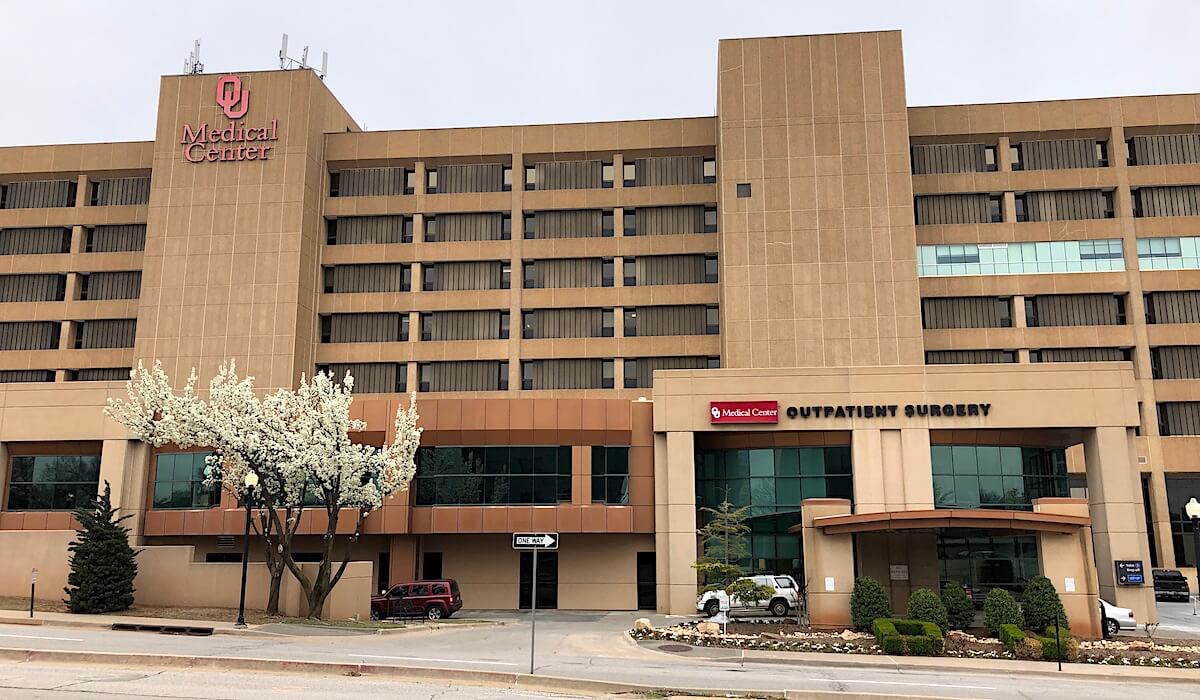
Regents also announced another enormous shift coming soon: the merger of the public OU Physicians practice group with the private hospital management entity OU Medicine, Inc. under the branding OU Health. With more details expected Tuesday and a July 1 effective date, the announcement could transition as many as 2,000 health professionals and support staff from state employee status to the private sector.
“There has been a separate organization that runs the hospitals and a separate organization running the doctors, and for the first time in their history, those two entities are going to combine as one unified academic health center,” OU regent Michael Cawley said during Friday’s meeting. “It’s really exciting from the standpoint that we’re now going to have economies of scale, efficiencies. I know that we’re going to have enhanced revenues, and more importantly we’re going to have enhanced health care for patients. It’s just going to be terrific.”
Cawley said one administrative body will now oversee the OU hospital system and its employees. He said a national search for a new CEO is underway.
“This will be the first time in the history of this institution and of this health center where the physicians are actually going to have a seamless transparent input into the hospital treatment of their patients, and it’s the first time that the people that work in the hospital are going to have seamless transparent communication with the physicians who are working on the people in their hospital,” Cawley said.
Pierson called the move “huge.”
“This will affect lives, and it will affect lives in a very positive way for decades to come,” Pierson said.
Pierson on BCBS dispute: ‘They’re not being transparent’
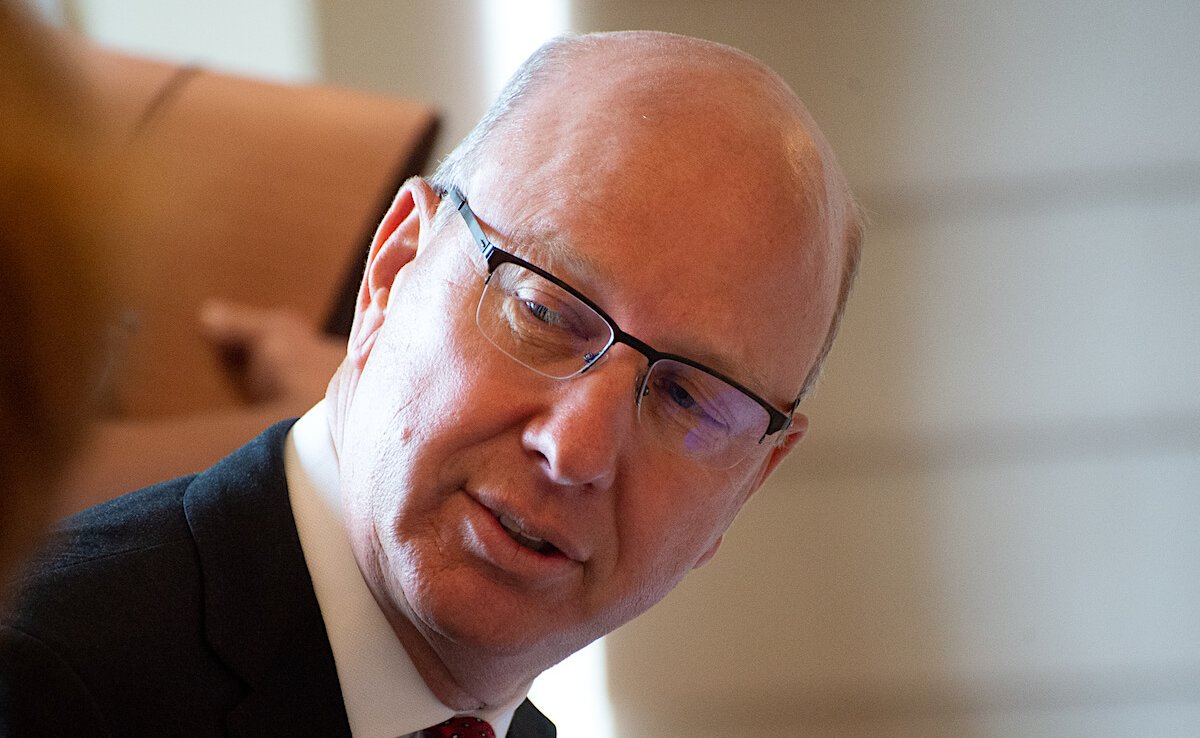
By the time Friday’s meeting came to a close after 3 p.m., Pierson had said plenty more. The former publishing executive whose term on the board is up for potential renewal by Gov. Kevin Stitt closed the day’s meeting with a 27-minute monologue about the “transformative” projects the OU Board of Regents has been working on over the past year.
The wide-ranging and impassioned speech emphasized the board’s three priorities — fiscal responsibility, innovation and long-term strategic planning — and included a reference to “reducing the amount of drama” surrounding the state’s flagship university.
The final seven minutes of Pierson’s remarks focused on the dispute between OU’s health system and Blue Cross Blue Shield, the largest health insurance company in the state.
“We’re this close to doing things that are amazingly beneficial to Oklahomans,” Pierson said, holding his fingers close together. “Not just people at OU, but Oklahomans. But we’ve got an impediment, and that opportunity is in jeopardy in part because of our friends at Blue Cross and Blue Shield.”
The impediment, Pierson said, is that OU’s physicians have been reimbursed by BCBS at rates about 30 percent lower than other insurers.
“For BCBS, [our physicians] get 70 cents on the dollar. That is simply unsustainable for the University of Oklahoma and the citizens of Oklahoma,” Pierson said. “It’s completely unsustainable. We have been living under this situation for about four years. We have gone to BCBS in a polite and dignified way.”
Walking the tightrope of politeness, Pierson criticized the “member-owned” insurance company, which holds a nonprofit status but is part of the national Blue Cross Blue Shield Association that has been criticized for paying large executive bonuses, making expensive headquarters investments and stockpiling financial surpluses.
“During a period when (…) their executives are being paid enormous bonuses, they’re not negotiating with us in good faith,” Pierson said. “They’re not being transparent with the public about it either, by the way.”
BCBS spokesperson Lauren Cusick provided NonDoc with an official statement regarding the situation. It read, in part:
We want to pay all our network partners, including OU Physicians, fair, reasonable rates, but must balance this with managing cost increases for our members. We negotiated in good faith to find a mutually beneficial agreement that was in the best interest of our members. Unfortunately, their demands unreasonably drove up what our members and customers would have to pay for access to care.
This is not the outcome we had hoped for, but our networks remain strong and robust and our members will continue to have access to thousands of quality, convenient and in-network providers in the Oklahoma City metro and across the state.
Our priority now is to work with our members to safely transfer their care, if they desire, to other in-network providers. BCBSOK members will receive in-network access to the doctors and health care professionals employed by OU Physicians during a 120-day transition period. On June 29, 2021, OU Physicians will leave our provider networks.
Both OU Physicians and BCBSOK have been running public advertisements in recent weeks criticizing one another.
“This is a very sad development for us. We’re going to work very hard to resolve this,” Pierson said. “Sorry for being so adamant about it, but this is pitiful.”
A balanced budget and a diversity course
Friday’s meeting also featured other discussions of note, including regent Natalie Shirley’s report from the Finance and Audit Committee, which is embedded above.
In a rare regents reference to the problematic state of OU’s finances by the time David Boren retired as president, Shirley highlighted something worth celebrating.
“OU’s budget is now balanced,” the former OSU-OKC president said.
Pierson thanked her for months of hard work establishing new monitoring and auditing protocols across OU’s campuses.
“There is no confusion about what is going on financially at the University of Oklahoma anymore,” Pierson said.
Where there may be confusion, however, is with a new inclusivity course called “Gateway to Belonging” planned as a freshman requirement beginning with OU’s fall 2021 semester (which, for now, is scheduled to feature a return to in-person classes).
“Every regent here has gotten a lot of commentary in some writings about a course we’re going to institute this fall (…). People have been very supportive. Other people not so much,” Pierson said. “I want to tell you about that course. It has a very specific design, and it’s to teach freshmen to treat everybody they encounter and one another with dignity and respect. Civil discourse, not name-calling, not guilting, not violence.”
“This is going to enable young people in the world in which they live to be productive citizens. That’s our job at the University of Oklahoma — to help mature young people into productive adults. Change their lives for the better. For those who are nervous about this course, welcome. We’re all nervous about it, too,” Pierson said. “We’re concerned about this course because it’s on a tightrope. It could delve into a bad situation if we let it. We’re not going to let it. It could be one of the leading programs in the country if we do it right, and we are going to do it right.”
Pushback over the effort to help young people to learn to treat each other decently raised eyebrows in the Oklahoma Legislature this week, as HB 1888 — a straight-white-male-authored proposal that “no public body shall conduct any form of gender or sexual diversity training or counseling” — was abruptly laid over on the House floor.
“To those folks who are negative about this, please refocus,” Pierson said of OU’s planned diversity and inclusion course. “[Students] are the young people who are going to run this country when we are no longer around.”
Pierson asked that critics of the course give students a chance to experience the course and offer their opinions.
“To the Sooner nation out there that is concerned about this: Try looking at it with a different lens,” he said. “If you have concern, let us know, but let us know in a constructive way.”

